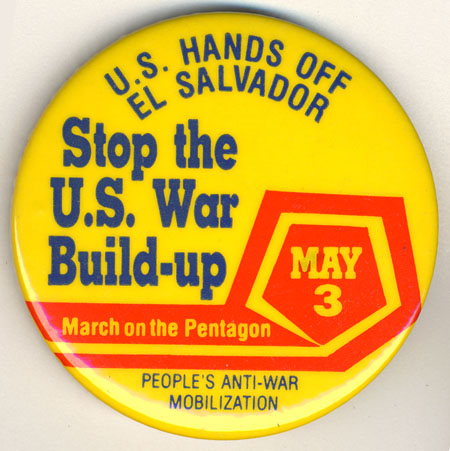
Credits: People’s Anti-War Mobilization. “U.S. Hands Off El Salvador. Stope the U.S. War Build-up”. TriCollege Libraries Digital Collections, 1981,
Introduction
On May 3, 1981, around 25,000 people marched on the Pentagon to protest US involvement in El Salvador. The People’s Anti-War Mobilization coalition organized the march with the goal of bringing together different groups of people who all had grievances with Ronald Reagan’s administration. The protesters began in the Constitution Gardens before heading over the memorial bridge to the Pentagon. As they marched, the protesters chanted different phrases such as “Money for jobs, not for war, U.S. out of El Salvador”. The protestors also carried signs and wore buttons such as the one shown in the above image. In reaction to the march, a counter group of protestors formed chanting slogans such as “No More Cuba, No More War, Castro Out of El Salvador”. Even with the tension between the two groups, the situation remained relatively peaceful with only one person being arrested. This 1981 march was the largest anti-war demonstration since the protests against the Vietnam War in the seventies. By conducting the protest, US citizens demonstrated their concern about US involvement in El Salvador even before they knew about the massacre.
Similar protests occurred throughout the decade especially as more evidence came to light of the human rights violations committed by the Salvadoran Army. Many people in the US felt that the Reason Administration should be focusing on solving their own country’s many issues rather than fixing another country’s problem. As the US government provided more financial support, people questioned why the president was giving millions of dollars away to a foreign country when that money could be spent helping people in the US. People also made comparisons between US involvement in El Salvador and the Vietnam War. While the US government just provided money and military supplies to the Salvadoran army, people feared that this support might escalate to the U.S. sending troops to El Salvador. People in the US questioned how the U.S. government could not have learned its lesson with Vietnam and continues to insert instead into other countries’ affairs. However, not everyone in the US shared the protestors’ concerns about US involvement in El Salvador. Like the counter-protesters, other people in the US praised the Reagan administration for its effort to protect other countries against the threat of Communism. US support for El Salvador’s government remained a contentious issue for the entirety of the Salvadoran Civil War and only grew more controversial as new people became aware of the human rights violations that the US government helped hide.